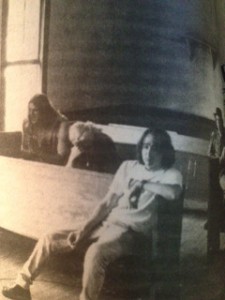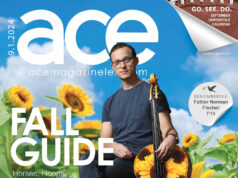BY SCOTT ARMSTRONG
With the radio waves waist deep in MTV heavy rotation, these days it’s tough to sell a gimmick-free band. Honest musicians attempting to succeed on their own merits face tougher hurdles than those acts willing to sell their sound to the latest retro craze. The Lexington-based Prayers are well aware of this. The path they’ve chosen is paved with Townes Van Zandt, Peter Green, John Cale, Ed Hazel and Richard Thompson; all of whom are artists who consistently outperform their contemporaries. In renouncing the jump-cut road to success, the Prayers seek to please themselves, and if a certain degree of success were to follow, then so be it.
 Two short years ago, the trio, Tim Welch (drums and vocals), Smith Donaldson (bass and vocals), and Willie Eames (guitar and vocals) began to whittle away at the Sequoia of musical influences that brought them together. Adding an insightful repertoire of cover songs to their list of originals, the band took to the studio and produced a self-titled CD, a sixteen-stong effort that was released in late March of 1994.
Two short years ago, the trio, Tim Welch (drums and vocals), Smith Donaldson (bass and vocals), and Willie Eames (guitar and vocals) began to whittle away at the Sequoia of musical influences that brought them together. Adding an insightful repertoire of cover songs to their list of originals, the band took to the studio and produced a self-titled CD, a sixteen-stong effort that was released in late March of 1994.
The disc covers a lot of ground. More importantly, by accurately capturing their live sound, they define a style which defies a single classification. Bassist Smith Donaldson described this music as a “synthesis of sounds.” And although they each draw from the same deep well of influences, every member adds his own flavor to a work-in-progress. Their popular cow-poky cover of the Velvet Underground’s White Light/White Heat, sounds like something Marc Bolan would produce if he were around today.
This is due in part to the fact that the group has not one, but four backbones. In February of 1994, when Albuquerque native Caleb Miles joined as an additional guitarist, the band found itself with four prolific songwriters. While this would spell certain disaster for most bands, it’s solidarity that the Prayers thrive on. Couple that with their penchant for improvisation and what you get is their current crystallized sound.
This ability to effectively perform without preparation, frequently surfaces during any number of the cover tunes they play. Local acts the Yonders, Paul K, and the Prayers are all known to tread on the groundwork of Townes Van Zandt. “To Live is To Fly” is a Van Zandt tune that the Prayers do not merely cover, they translate. Conversely, their faithful rendition of Led Zeppelin’s “Ten Years Gone” will turn the most ardent Zeppelin fan back to Physical Graffiti, scratching their head and thinking they’ve missed something. Welch spoke about the current trend (perpetrated by the overly-familiar grunge babies) of bashing 70s rock giants such as the Stones and Zeppelin. “There’s a reason that these albums were played ad nauseum; it’s because they were great.”
As for me, I’ve spent the last six weeks listening to a tape these guys gave me consisting of eight demo tracks slated for possible inclusion on an upcoming release tentatively titled Beautiful Lies About the Ugly Truth, which gets my vote for title of the year. It will be the first release from the group as a quartet, and although it would be easy to say that these songs have the solidarity of Blind Faith or the urgency of early Replacements, the sound is pure Prayers — nothing else. And when you show up at a Prayers gig, that’s exactly what you’ll get. As Miles put simply, “We just concentrate on playing good music. The purpose of this band was not to fill any specific void in an already diverse local scene.” Welch explains, “This town really needs a good reggae band. Sure, we could work out some stuff and play out as ‘Jah Honkey’ or something, but that’s not what we’re about.”
When I asked who they admired locally, the Yonders and the Blueberries popped up, followed quickly by Taildragger, Rabby Feeber, and anything with Frank Schaap. Of the Blueberries, Welch says, “They’re lightyears ahead of anything on MTV.” Funny, I was just going to say that about the Prayers.
At a recent Friday night gig at Lynagh’s, I saw the Prayers headline a show that got underway with a tie-off-and-fix, slow heroin funk re-do of Sly Stone’s “Thank You (Falettinme Be Mice Elf Again)” that segued into a Caleb Miles original, “You Always Win.” Other highlights from a night filled with memorable tunes included “Dumbstruck” with an Allmanesque dual-lead melody, “Don’t You Want to Stay,” an R&B number that sounded like an instant standard, and with Frank Schaap at the helm, tore through the Band’s “The Shape I’m In.”
As with any accomplished group, experience and perseverance is necessary groundwork and the three founding Prayers are certainly no strangers to Lexington’s music scene. Credited with founding the Prayers, Smith previously performed in the group Bad Ethel, and also pulled a short sting as bassist for Paul K and the Weathermen. Willie Eames (who seems to improve with each show) was an effective drummer for local guitar vets, Gnarly Love. He also played guitar in Welch’s post- Red Fly Nation act, Strictly Wet, as well as the short-lived Sister Fanny. For my money, Welch is Lexington’s quintesseential drummer. I’ve watched him play for nearly a decade in many of this town’s most memorable acts. Honing his style in Paul K and the Weathermen, he saw that effort through its most enduring and productive period. Riding a cresting wave, he backed the sadly defunct Red Fly Nation as they released arguably the best full-length tape in recent Lexington memory. Welch continues to lend his talents to both the Yonders and the Lily Pons.
In the past few months, the Prayers have played fine clubs in larger metropolitan areas: ex-Replacements hangout the Uptown Lounge in Minneapolis; The Smiling Skull in Athens, Ohio; the Warehouse in Clarksville, Tennessee; Quarters in Milwaukee; and a special appearance on unsigned band night at the infamous CBGB in New York. They regularly perform locally at the Wrocklage, Lynagh’s, JDI, and Cheapside Bar.
Presently they’re rehearsing songs for their forthcoming release to be recorded at David Barrick’s Sound Recordings in Glasgow, Kentucky. The main objective is to capture their live, “wall of sound.” If you think that sounds simple, it ain’t. “Years from now, the disc is what’s remembered,” Welch said. “Many of us will remember much, much more.”








